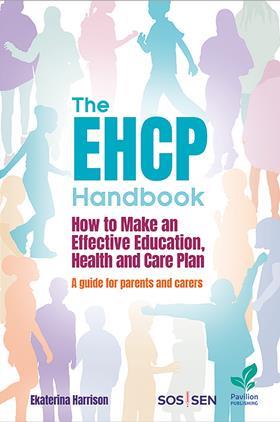The EHCP Handbook: How to Make an Effective Education, Health and Care Plan: A Guide for Parents and Carers
Ekaterina Harrison
£24.95, Pavilion Publishing and Media
★★★★✩
Parents of children with special educational needs and disabilities (SEND) often face a landscape fraught with many challenges, so parent-friendly resources that support the navigation and understanding of the SEND legal framework are welcome and beneficial.
As stressed by the author, this book is primarily focused on the content of education, health and care (EHC) plans. Parents who have yet to take the first step of requesting an EHC needs assessment from their local authority (LA) should note this topic is not covered in detail, though the author does touch on it and, in doing so, helpfully dispels some common myths.
Throughout this book, impressive emphasis is placed on important yet commonly misunderstood (and thus often overlooked) aspects of getting an EHC plan which is fit for purpose. An entire chapter is dedicated to gathering information and advice. The author repeats the crucial point that the quality of an EHC plan significantly depends on the advice and information used to write it. For this reason, this book is likely to be well suited to parents who have just received their LA’s agreement to carry out an EHC needs assessment, as well as those who are at the stage of analysing the content of a draft EHC plan.

Particularly useful information includes a clear distinction between special educational needs and special educational provision. Several pages are dedicated to the importance of specificity in EHC plans and commonly encountered problems which occur when vague language is used. Practical steps to ensuring what is written in the plan is clear and that content is placed in the correct sections, along with extracts from statutory guidance and plenty of case law references are advantageous.
The author is clear that the book does not aim to cover every detail, and I found this particularly true of the segment about naming an educational setting in an EHC plan. Information on the lawful exceptions to naming the parental-preferred setting is very brief; I feel further exploration of the legislation and case law, along with reassurance that the thresholds of exception are high, would have been both beneficial and empowering. That said, readers are signposted to plenty of helpful sources and encouraged to explore topics further.
Producing a resource that contains complex information, without being overwhelming for the reader, is a difficult balance. The author has lived experience of parenting and advocating for a child with SEND. This comes across in her delivery and through the provision of relatable and interesting visualisation exercises and analogies. While I do not agree with every single point made, there are many on which I do agree and, overall, I think this book would be a useful addition to the SEND parent’s resource library.
Liz Devlin is a member of the legal team at the SEND advice charity Independent Provider of Special Education Advice (IPSEA)































No comments yet